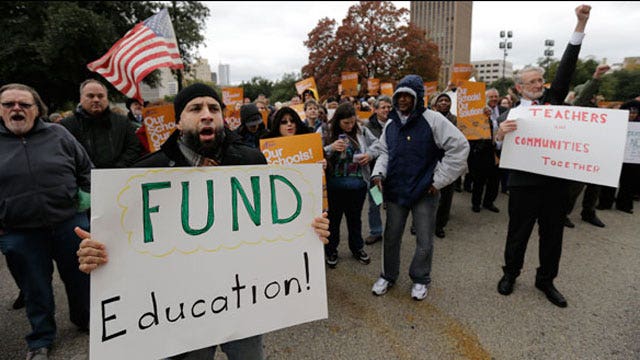Teachers' unions to spend record amount on midterm elections
Mike Emanuel reports from Washington, D.C.
The top teachers unions are flexing their muscle ahead of the November midterms, spending at least $60 million on television ads and ground operations hoping to have a major impact on close gubernatorial and Senate races.
In North Carolina's Senate race, Republican Thom Tillis is trailing Democratic incumbent Kay Hagan by just a point, according to an average of recent polling. But the Republican, who has battled with teachers unions during his time as state House speaker in Raleigh, has been attacked anew by their ads in the Senate race.
At a recent debate, Tillis rejected ads that accuse him of pushing budget cuts that hurt students.
"It's simply false. Since 2011 we're spending a billion dollars a year more on education," he said. "This year, we provided an average 7 percent pay increase for teachers."
Over in Arkansas, the unions likewise are providing help to the Democrats with TV ads and other spending -- investing more than $1.6 million in the Senate race alone.
In that race, Republican Rep. Tom Cotton has opened up more than a 5-point lead over incumbent Democratic Sen. Mark Pryor, according to the Real Clear Politics average of polling.
A recent ad called "Take Away" features a teacher criticizing Cotton for wanting to cut the same federal loans he used to attend Harvard University.
Cotton has said he favors local banks handling student loans over the federal government. "Unfortunately, too many students today struggle for years to repay their loans because Washington politicians dictate student-loan rates and end up hurting students and taxpayers alike," Cotton said in a statement.
In Kansas, Republican incumbent Gov. Sam Brownback has a very slim lead over his Democratic rival. He, too, is taking heat after cutting public education $56.6 million, which critics have called an experiment gone wrong.
While the unions are engaged in both Senate and gubernatorial races, Karen White of the National Education Association explained their top priority.
"We've been very focused this term on both United States Senate races, and gubernatorial elections, but as you know, the bulk of education policy happens at the state and local level," White told Fox News.
American Federation of Teachers President Randi Weingarten has been more blunt, accusing candidates and interest groups in an interview with Politico of "trying to marginalize unions, demonize teachers and dampen the vote."
AFT is expected to spend $20 million on the midterm election -- more than in past presidential races -- while White says the NEA will spend in the "$40 million range."
"As you know, educators can't write million-dollar checks or $10 million checks, but they can write $25 checks and $10 checks," White said.
Political analyst Michael Barone, of the Washington Examiner, said cash from members' dues makes the unions a powerful political force. "They generate a lot of money for Democratic campaigns or against their opponents," Barone told Fox News. "They get that money from the public employee union members who receive their salaries from public taxpayer funds."
Among the concerns for these unions are Republican-led efforts to stop them from automatically deducting dues from teachers' paychecks -- the fear being if the dues aren't automatic, educators could decide not to pay them, rendering the unions a less potent political force in the future.





